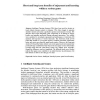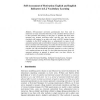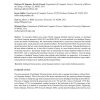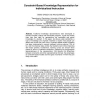141
click to vote
AIED
2011
Springer
14 years 5 months ago
2011
Springer
Intelligent Tutoring Systems (ITSs) have been used for decades to teach students domain content or strategies. ITSs often struggle to maintain students’ interest and sustain a pr...
135
click to vote
AIED
2011
Springer
14 years 5 months ago
2011
Springer
Many Intelligent Tutoring Systems (ITSs) have started to incorporate game-based components in an attempt to improve student engagement during system interactions. iSTART-ME is a ne...
232
click to vote
AIED
2011
Springer
14 years 5 months ago
2011
Springer
Self-assessment motivation questionnaires have been used in classrooms yet many researchers find only a weak correlation between answers to these questions and learning. In this pa...
137
click to vote
ACL
2010
15 years 9 days ago
2010
Supporting natural language input may improve learning in intelligent tutoring systems. However, interpretation errors are unavoidable and require an effective recovery policy. We...
130
click to vote
AIEDU
2008
15 years 26 days ago
2008
To investigate whether more concise Natural Language feedback improves learning, we developed two Natural Language generators (DIAG-NLP1 and DIAG-NLP2), to provide feedback in an I...
152
click to vote
JBI
2008
15 years 1 months ago
2008
In this paper, we present a novel collaborative authoring tool that was designed to allow medical teachers to formalize and visualize their knowledge for medical intelligent tutor...
141
click to vote
AIEDU
2004
15 years 2 months ago
2004
Although animated pedagogical agents are frequently found in intelligent tutoring systems and interactive learning environments, their effect on users' attitudes and learning ...
149
click to vote
CLEIEJ
2007
15 years 2 months ago
2007
This paper presents a description of the environments of individualized learning (Based on the Intelligent Tutoring Systems, ITS), the Computer Supported Collaborative Learning (C...
110
click to vote
COMSIS
2006
15 years 2 months ago
2006
Traditional knowledge representations were developed to encode complete, explicit and executable programs, a goal that makes them less than ideal for representing the incomplete an...
138
click to vote
AIEDU
2007
15 years 2 months ago
2007
We present an approach to designing intelligent tutoring systems, termed the Difficulty Factors Approach. In this approach, the designer investigates, at each iteration of the desi...




